Turris
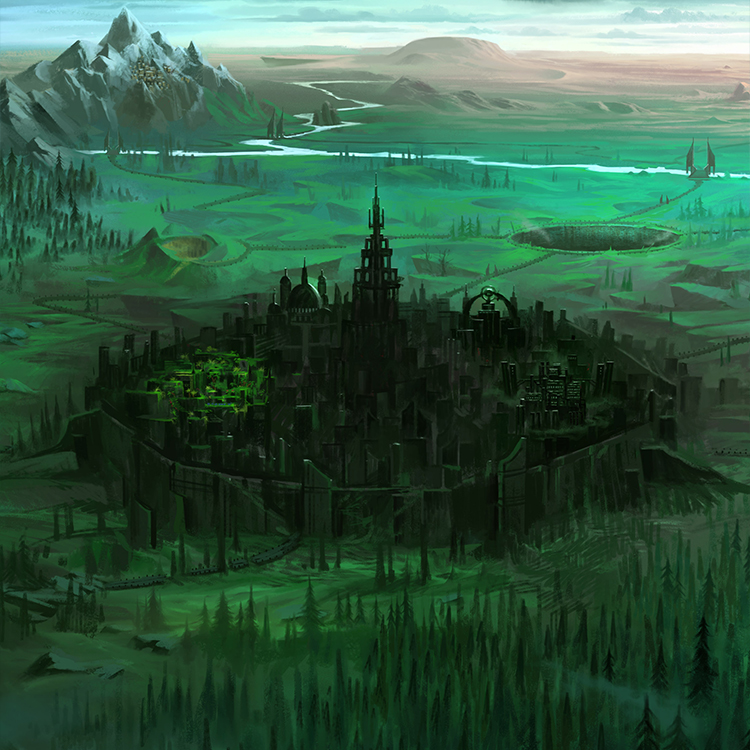
In Turris, players take on the role of tribe leaders in a post-technology society. Near a once glorious city, tribes of scavengers are all that remain of a technologically advanced humanity.
In recent times, the ground has split open and what can only be described as “Beasts” have risen from the abyss. Do they represent divine punishment, or some natural phenomenon? Regardless, to survive you must build the Tower, the plans for which were found in an ancient technology trove. The Turris blueprints require the tribes to once again embrace the knowledge and weapons of their ancestors.
Turris is a competitive Worker Placement game where players attempt to build a Tower from ancient plans created by their ancestors as a final defense mechanism. You assign your Scouts to acquire resources and knowledge of the scattered ancient technology, all the while being constantly chased (and often devoured) by and terrible and unstoppable Beasts risen from the depth of the Abyss. Should you fail, the Beasts will consume everything and everyone.
The Council was formed to lead the tribes in this dire time. The tribes all follow its directives and complete its missions, but as a tribe leader you know that once the Tower is built and humanity is saved, it will dissolve without strong leadership. In building the Tower, you acquire PPs (Prestige Points), which represent your standing amongst the tribes. The leader with the most PPs will take control of the Council and lead humanity into the future.
Turris uses tarot sized gold/silver lined Trionfi Cards to represent Tower rooms, miniatures that represent the Beasts and decks of Mission and Action cards.
PREHISTORIC TIMES
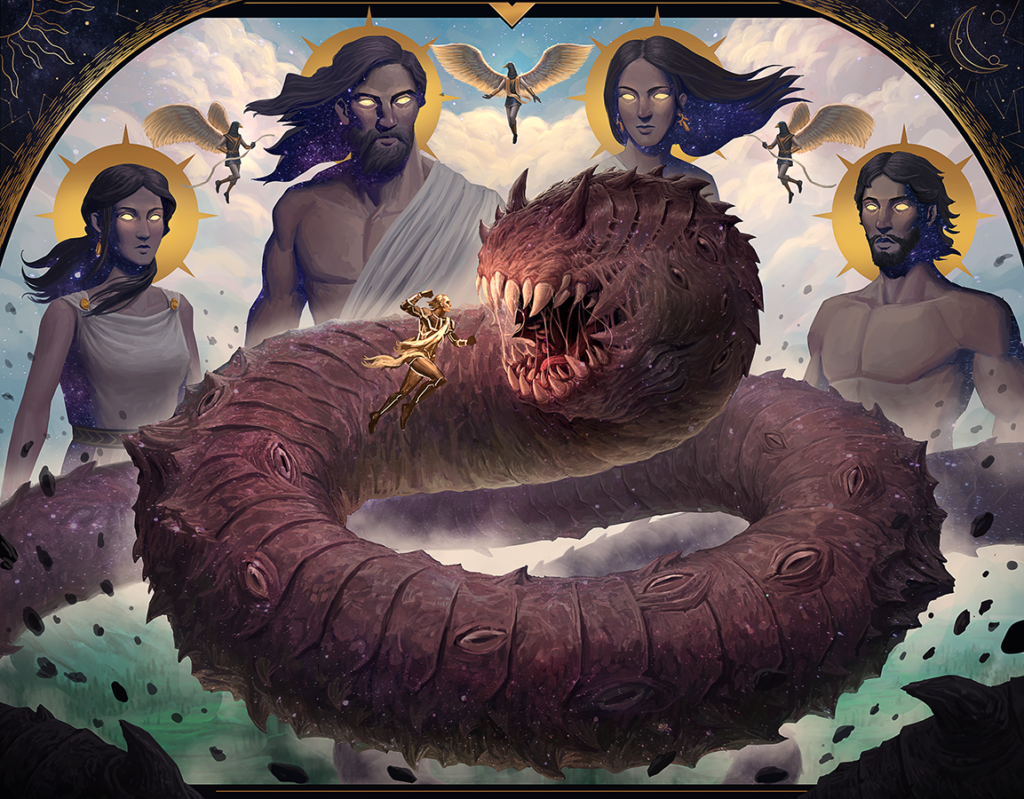
Before the Soil was created, there was nothing. Not even the concept of time itself — it is unknown how long the nothingness was there, only when it ended.
Out of that void the gods emerged: Gabat, god of strength; Yalmu, goddess of cognition; Tev, god of creed; and Koddal, goddess of endurance.
And with an immense thrust Gabat split the void into the Firmament and the Soil. And the Soil spread out endlessly in all directions.
The gods who trod the Soil shaped it, creating plains, mountains, oceans. The further the Soil spread, the more wondrous landscapes there were.
And then the gods took some of the Soil, and molded all kinds of creatures from it, and populated the Soil. And the further the Soil spread, the more miraculous creatures there were to be seen.
Then it came to pass that the Soil reached the end of infinity. And from beyond infinity came the Maw, which was a hungry being of enormous size, larger than anything on the Soil. Its mouths, of which were millions and millions, cried in anticipation of the feast. And the Maw swooped down onto the Soil and started to devour it, going in circles, round and round. And with each circle it bit off more and more of the Soil. Whatever and whoever was on the Soil, disappeared into the insatiable mouths of the Maw.
Yalmu saw that and was horrified by the brutishness of the Maw, and she told the other gods about it. Gabat rushed to the monster, but even his limitless strength was not enough to stop it, so he called for help of the other gods. And the four gods attacked the Maw together and fought it relentlessly, but even their combined efforts were not enough to stop it.
So the gods took what was remained of the Soil, leaving only a tiny piece, and shaped a giant champion named Turris to defeat the Maw. Gabat filled his muscles with strength, Yalmu opened his eyes to everything in the world, Tev taught him to be righteous, and Koddal mortified his flesh, so it could withstand the power of the Maw.
And when Turris confronted the Maw, he jumped at it and closed his arms around it in a mortal grip, attempting to suffocate it. And the Maw sank its teeth in his flesh, tearing it off, but Turris bore the pain. The Maw flung itself about the sky, trying to free itself, but Turris held firmly. The Maw smashed the giant to the ground, but Turris didn’t let go.
They battled for three days incessantly. The veins on the arms of Turris burst open, and he bled. Almost blind from the pain and inconceivable effort expended in defeating the Maw, he did not give up. The Maw was fatigued, but did not yield. High in the sky they still wrestled.
At the end of the third day, just before nightfall, Turris realized that he would not be able to go on much longer. Gathering all his strength for one final push and knowing that he would not survive, he tore the Maw in half, and they both collapsed to the ground. A huge cloud of dust from all the devoured Soil came forth from the Maw’s enormous belly.
As the grains of dust were falling to the ground, they turned into figures. The gods looked at them and saw they were living beings, and they were afraid that it was the Maw’s offspring. But when the creatures saw the gods, they pleaded for mercy and said they weren’t children of the Maw.
There was no immediate threat, but still the gods were wary. Gabat said that these beings could not stay on the Soil, and that they were to be expelled from its face. Yalmu and Tev agreed; Koddal, however, being more temperate, said that the creatures had to be given a chance. They appeared out of the dust of the Soil itself, and therefore belonged to it. After considering the choice, the gods decided to let the creatures stay and named them Daeva.
Then Yalmu addressed the other gods with another pressing matter. After the Maw attacked the Soil, it became so small compared to the endless void that it risked being lost. Something had to be done to prevent the loss of the precious remains of the Soil. So Yalmu came up with a plan to erect a beacon in the center of the Soil, so that the gods would be able to see it from anywhere. And in order to preserve the Soil, a complex of mechanisms was to be built below the surface. And the gods did that — first the tall beacon was raised, and then an array of various machines was put in the tunnels underground to observe and regulate the Soil’s existence.
Then Tev brought Daeva to the beacon and told them they were to maintain it. Every year a face would appear in the fire of the beacon. Whoever that would be, they had to be brought to the sacred Garden, adorned with the exquisite fruits, and then thrown into the beacon’s furnace. Daeva were terrified, but this ritual was the condition for them to be allowed to settle on the Soil. So they agreed unwillingly.
Yalmu took pity on Daeva who were helpless, and taught them how to use tools and how to build. So the Daeva built a city around the beacon, which was a tall spire. And they named the city Omnipolis.
ANCIENT HISTORY — THE CATACLYSM
And it came to pass that Omnipolis became vast and prosperous. And the lands beyond it were all explored by Daeva.
Every year they sacrificed their brethren to maintain the beacon, and tears were shed, but such was the price of life.
Once, as Daeva assembled around the beacon’s Spire, the face of their king’s daughter appeared in flames. The people gasped in horror, and the king left silently to his chamber and did not receive anyone.
On the next day Ornati, the bird folk from the East, came to see the glorious Omnipolis with their own eyes. And they admired it truly, and brought presents to the king who refused to leave his room to meet the guests. Daeva were grateful to the bird people and asked if they could give something in return. Ornati said they came to ask for a royal marriage — the king’s daughter, who was known to be young and fair, was to become wife of the prince of the bird folk.
Upon hearing this, Daeva became gloomy and replied that that request could not be granted. They then offered to ask for anything else and promised that it would be given to them. Ornati, however, became angry and said they did not need anything other than the king’s daughter. Then they left.
As night fell, Daeva realized that the king’s daughter was not in her chamber. They rushed to the king and told him that Ornati stole her. When he heard that, he jumped up in fury and told the heads of the families closest to the court to gather their forces and seize Ornati.
Once they all assembled behind the city walls, the king mounted his horse and rushed towards the East, followed by the others.
The chase went on for days without rest, and finally they arrived in the lands of the Ornati. Mad with wrath, they proceeded to slaughter everyone they saw, while looking for the king’s daughter but she was nowhere to be found. Finally they learned that the royal family of the bird folk escaped shortly before the arrival of Daeva together with the princess. Devastated, they departed, leaving ruins behind.
As they were approaching Omnipolis, the clouds were getting thicker and heavier. When the city was about to appear on the horizon, the sky turned black, and day became night. The king, realizing that without his daughter, it would not be possible to carry out the ritual and something terrible might have happened to the beacon, told his people to advance with caution.
When they came closer and was not far away from the city walls, they heard a deafening roar, so loud it could be heard anywhere on the Soil. The ground trembled, and an enormous Abyss appeared in front of the gates of Omnipolis, but the roar did not stop — it was only getting louder and louder, and Daeva realized it was coming from that Abyss, from deep underground. When it was barely tolerable, the air so thick with that roar that the people felt they were suffocating, all of a sudden it stopped, but it was silent only for a brief moment.
Out of the Abyss came swarms of vile animals led by the four Beasts:
The first of them, Pain, mutilated and screaming in endless agony, its countenance turning the beholder’s blood cold, crawled out of the Abyss on twisted limbs.
The second, Delusion, floated out of the chthonic depths as a cloud of nauseous gas, poisoning the air all around it.
The third, Despair, came in a ringing silence, and all that was close to it withered and decayed.
The last one, Harrow, came dragging its gigantic scaled and spiked tail which ripped the earth behind it.
The Beasts stormed into the city and killed everyone in the streets and in the houses. The king and the families watched the massacre from the hill nearby in horror. Their initial readiness to fight for their home disappeared as they saw how all resistance was broken with ease, and other Daeva convinced the King not to approach the walls of Omnipolis, which became devoid of all life in one night. Defeated, cursing themselves for their cowardice, but still alive, the few remaining Daeva escaped to the other side of the river which was flowing in front of the city, and hid in the mountain ridge.
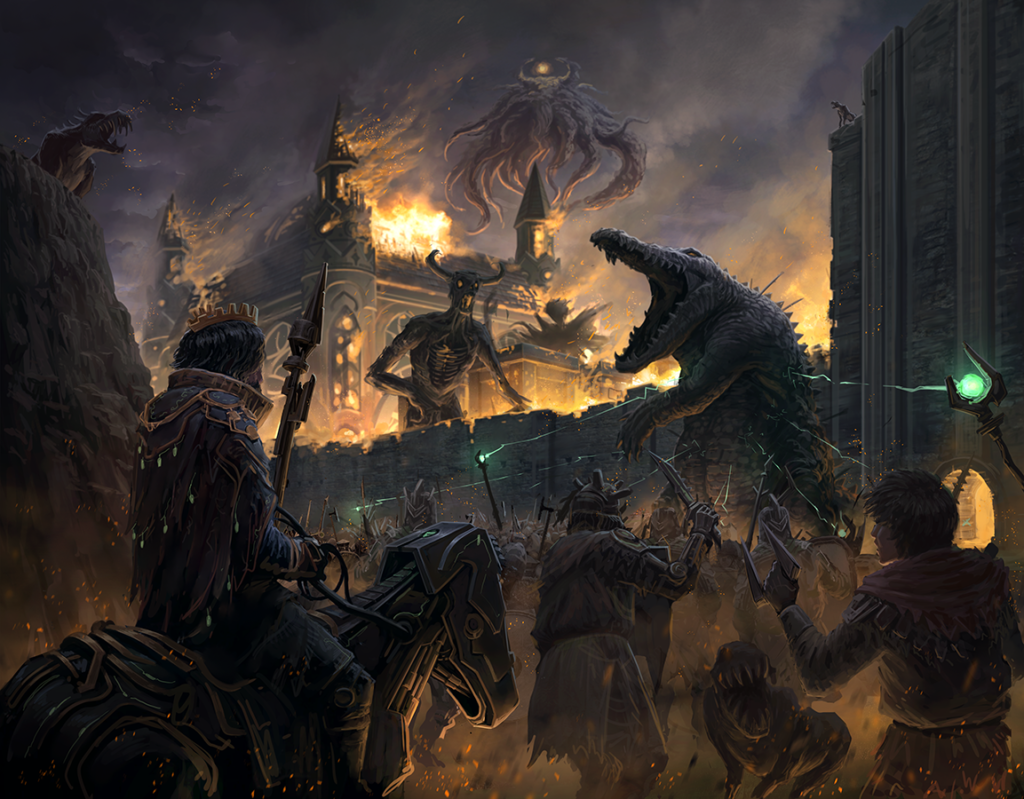
THE EXILE
High up in the mountains the Daeva established a settlement in a grotto to hide from the Beasts. Resources were scarce, but they endured.
After years of endless fear, the king passed away. After they fled from Omnipolis he became taciturn and unsociable. He never fully recovered from that shame, and it destroyed him. Nevertheless, even with that suffering he lived a long life — far longer than expected. This fact was debated amongst the Daeva, but none dared to approach him about it.
After his demise, the patriarch of one of the families who sought to learn the mysteries of life and death told his kin that he was going to examine the king’s body to learn about his longevity. That had to be done secretly, since other Daeva would not accept it.
After long hours of research they managed to obtain a recipe for an elixir of life. Due to its nature, it could only be produced in small volumes, so the patriarch decided to share it only with his clan and conceal this knowledge from the others.
On the next morning they sent off the other Daeva to look for food. Upon return the families found out that the gates were shut. They begged and pleaded for it to be opened, but they received no answer. As they prepared to break the gate, the traitorous patriarch appeared on the threshold and told them he would use the settlement’s weapons against them if they did not leave. They did not believe him and began breaking down the gate, but he did as he threatened. Many died, but some survived.
Having nowhere else to go, they settled in the desert on the Brink of the Soil. Broken and without proper means of survival, the exiles soon regressed to an almost primeval state. As years passed, the four families that had become the desert’s sole inhabitants turned into tribes: the tool-makers; those who strived for knowledge; those who tilled the ground until it obeyed and gave up food for the exiles; and those who shepherded souls. Generation after generation, forsaken in the desert and fighting for survival, pleading with gods for help but getting no answer, forever hiding from the Beasts, the people lost all remembrance of their past, of the technology and knowledge of their ancestors.
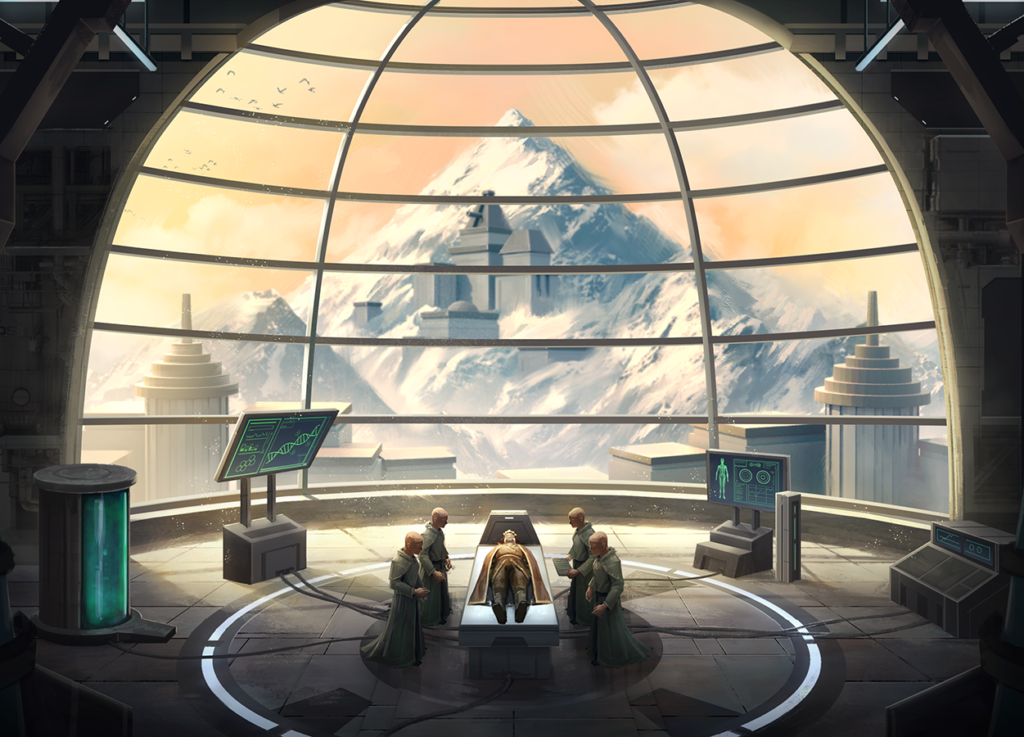
THE SECOND ATTACK AND THE HOPE FOR SALVATION
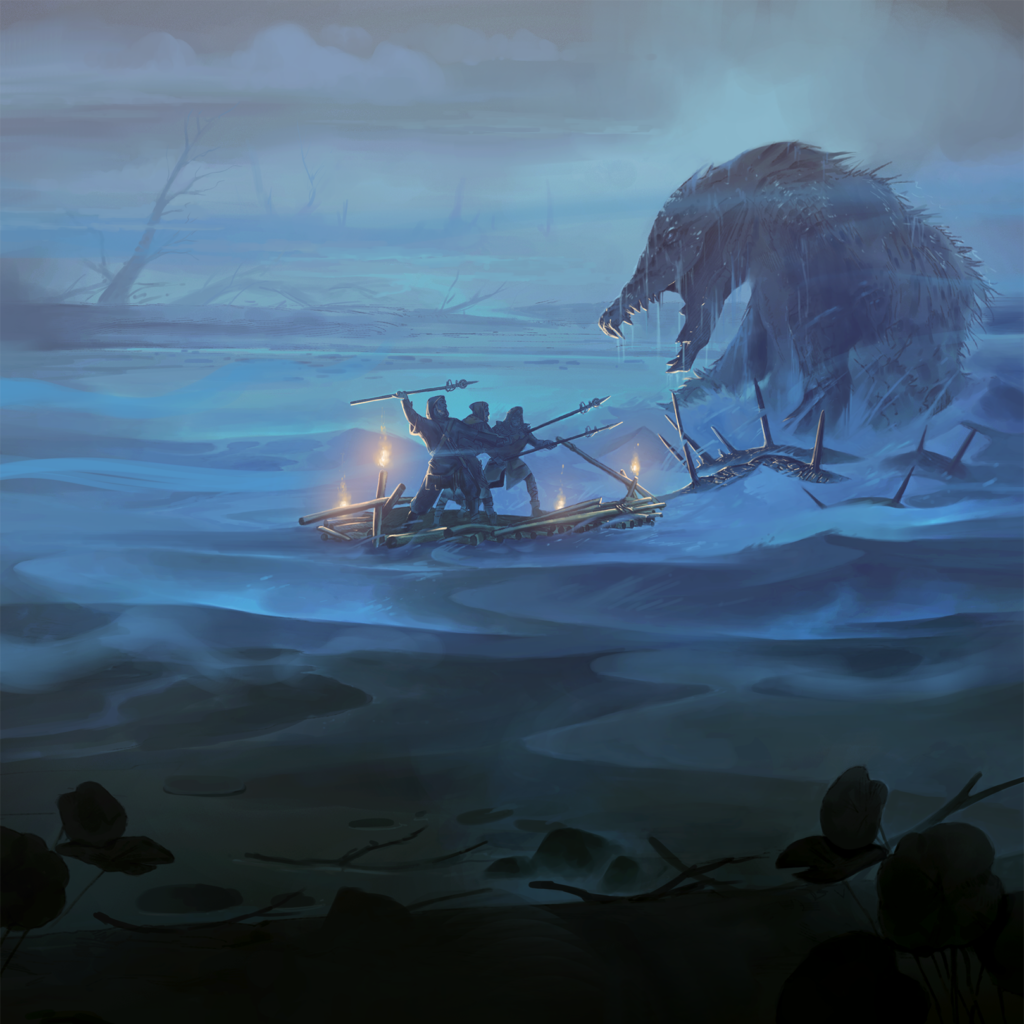
The exiles didn’t stay alone for long, however.
The Beasts, who initially only roamed the ruins of Omnipolis, started raiding the exiles in the desert. Having lost all their technologies, they could not resist. Soon all hope was lost, and the tribes prepared to perish.
And then the Ichor rains came.
Never seen before, the giant reddish-brown clouds appeared in the sky, pouring down an oily substance which healed wounds, nourished the starving, and powered the ancient tools of Daeva. But its lifetime was short: several hours after the rain the drops would evaporate, leaving only the orange fog slowly dissipating in the air.
The exiles did not know where Ichor came from: was the hand of help from the gods who had forgiven them, or were the gods dead and Ichor was their blood spilling from the skies?
But in any case, Ichor was a miracle.
After the first rain it became apparent that the hill in the depths of the desert, on the very Brink of the Soil, was in fact the body of Turris, the giant who defeated the Maw and saved the Soil. The Daeva heard this story from the gods, but now the exiles could see the evidence with their own eyes. Hope returned.
As they examined Turris, they learnt it was built of a similar technology to that which their ancestors used in the glory days of Omnipolis. Scrutinizing the remains thoroughly, they realized some of the technology could be utilized, though ultimately they were lacking the knowledge and tools to use it properly. They needed the legacy of Omnipolis.
It was then when the patriarchs of the tribes created the Council which was to bring Daeva to salvation. The Council assembled on the head of Turris, an improvised elevation they called Pagos, and glimpsing into the endless void beyond the Brink of the Soil, seeking guidance from the stars themselves, they undertook a decision.
Though clearly the giant could not brought back to existence to once again to provide defense from the otherworldly threat, his remains contained scraps of the plans which the gods used to animate him and prepare it for the battle with the deadly foe. The limited understanding of those plans that Daeva had was adapted to a more realistic solution. Instead of creating a mobile construct, they would build a stationary structure.
The Council dictated that Turris would serve as the base for the Tower which would give Daeva protection once and for all. The exiles would place a piece of every part of the Soil that had to be preserved. Through saving their home, they would save themselves.
And the Council commanded the tribes to send scouting parties into the ruins of Omnipolis and the rest of Soil in order to gather what was necessary to construct the Tower. Beasts or not, the survival of the kindred was of utmost importance.
And although many scouts never came back, little by little the Tower started growing taller.
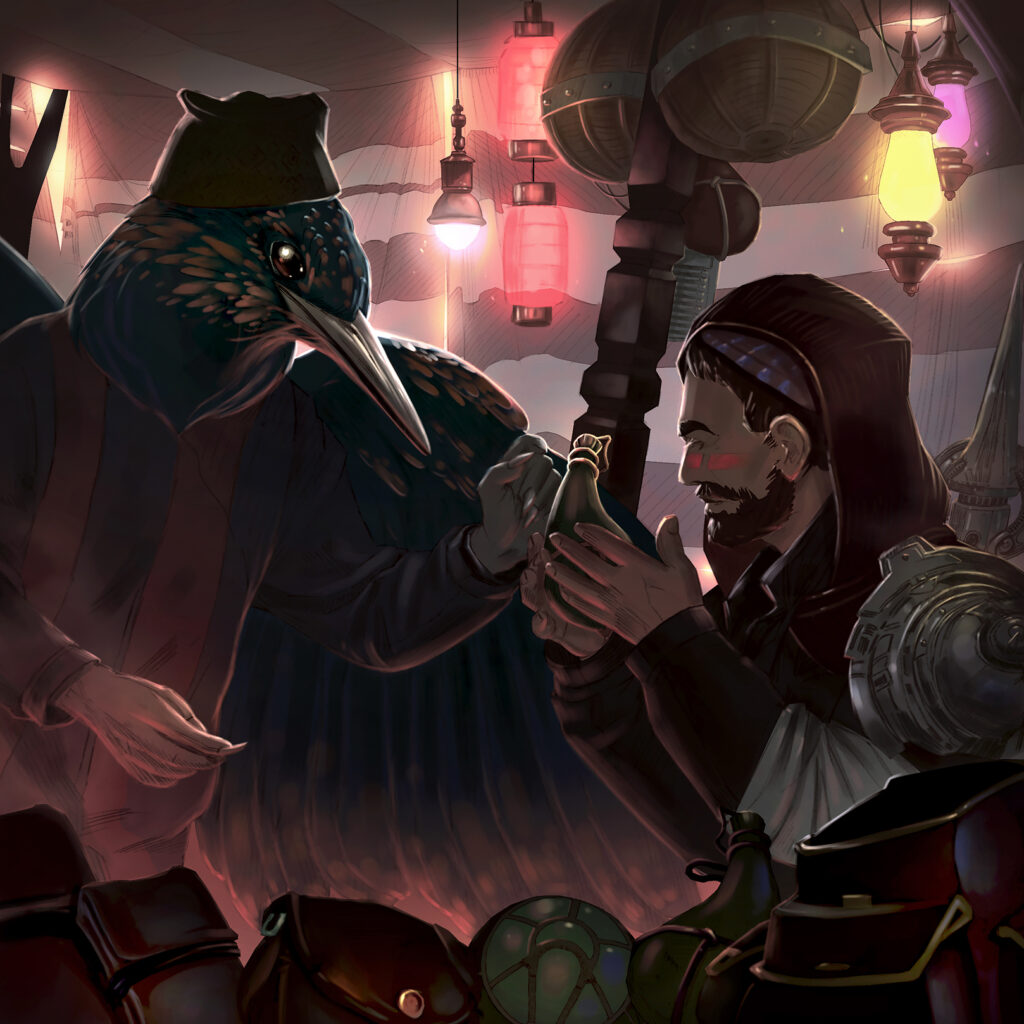
Enjoy the lore? Check out our rulebook here: rulebook(pdf 4 MB), and the rulebook errata(pdf 2 MB)!